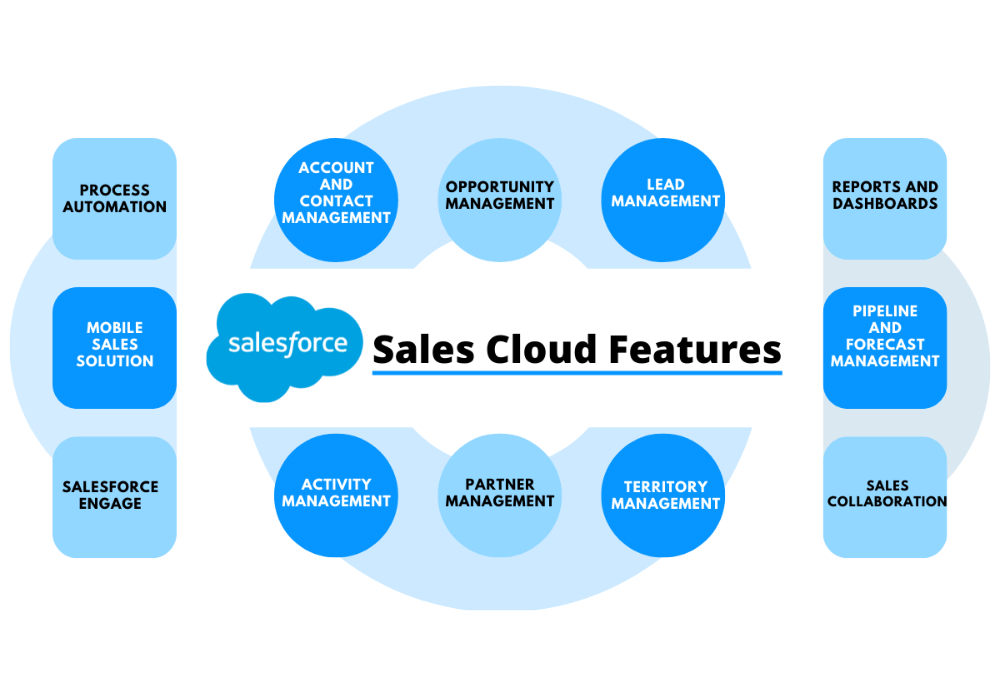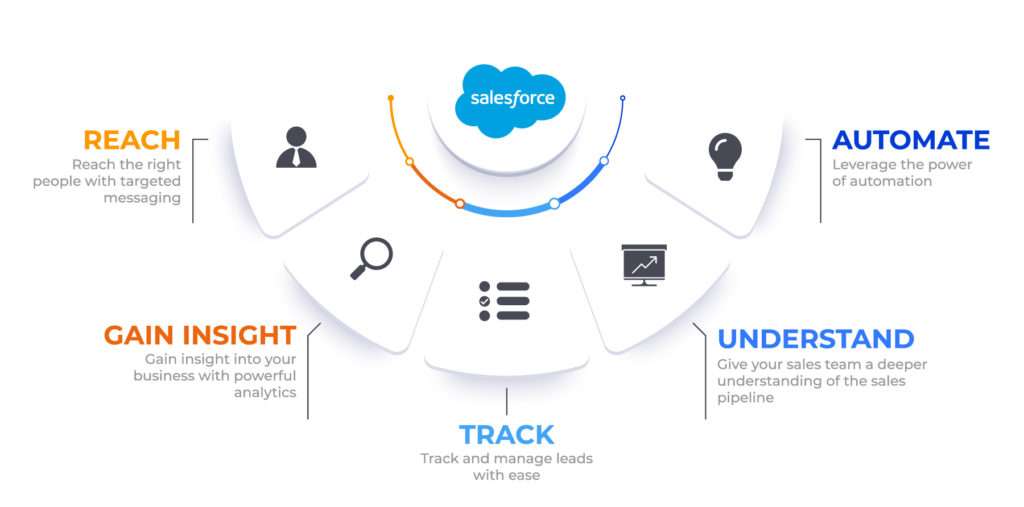
- Introduction to Salesforce Sales Process
- Importance of Sales Process in CRM
- Stages of Salesforce Sales Process
- Lead Management and Qualification
- Opportunity Creation and Tracking
- Managing Contacts and Accounts
- Pipeline Management and Forecasting
- Sales Automation and Workflows
- Reporting and Analytics
- Enhancing Sales with AI-Powered Insights
- Best Practices for Sales Process Optimization
- Common Challenges in the Sales Process
- Conclusion
Introduction to Salesforce Sales Process
The Salesforce sales process is a structured framework that organizations use to manage customer interactions, from lead generation to closing deals. It provides a streamlined and organized approach for tracking sales activities, managing customer data, and driving business growth. Salesforce offers a highly customizable platform that allows businesses to define their sales stages, automate tasks, and analyze performance through reporting tools. Companies can increase efficiency, improve accuracy, and enhance customer satisfaction by standardizing the sales process. For those looking to enhance their skills, Salesforce Training offers valuable resources. The platform enables collaboration across departments, ensuring that sales, marketing, and service teams work together effectively.
Importance of Sales Process in CRM
The sales process plays a vital role in Customer Relationship Management (CRM) by ensuring that every customer interaction is tracked and managed effectively. With Salesforce, organizations can:
- Improve lead conversion rates: A structured process ensures that leads are nurtured and followed up on systematically.
- Enhance customer satisfaction: Timely responses and personalized communication result in better customer experiences.
- Optimize sales performance: Sales teams can track their progress, identify bottlenecks, and adjust strategies accordingly.
- Standardize operations: A clearly defined sales process ensures consistency, which is essential for business scaling.
- Data-driven decision-making: Salesforce’s reporting and analytics capabilities enable data-driven insights for better decision-making.
Become a Salesforce expert by enrolling in this Salesforce Training Online Course today.
Stages of Salesforce Sales Process
The Salesforce sales process generally follows a structured sequence of stages aimed at guiding prospects efficiently through the sales funnel. It begins with lead generation, where potential customers are identified through marketing campaigns, referrals, or website inquiries. This is followed by lead qualification, in which the leads are evaluated to determine their potential value and alignment with the organization’s offerings. Once qualified, leads are converted into opportunities, officially initiating the sales process. During the proposal and negotiation stage, sales teams present product or service options and work with the client to agree on terms. The next phase, closing the deal, involves finalizing the agreement, addressing any objections, and securing the contract. For those looking to deepen their expertise, Salesforce Training can be a great resource. Finally, post-sale follow-up ensures customer satisfaction through ongoing engagement and support, reinforcing long-term relationships.
Advance your Salesforce career by joining this Salesforce Training Online Course now.
Lead Management and Qualification
Lead management in Salesforce involves capturing, tracking, and qualifying leads to convert them into opportunities. Key components include:
- Lead capture: Salesforce automatically records lead data from web forms, emails, or manual entries.
- Lead assignment: : Leads are assigned to sales representatives based on territory, industry, or What is Salesforce Testing lead scoring.
- Qualification criteria: Salesforce allows sales teams to define specific qualification parameters, such as budget, need, and decision-making authority.
- Lead nurturing: Automated workflows and email campaigns help nurture leads until they are sales-ready.
- Lead conversion: Once qualified, leads are converted into accounts, contacts, and opportunities, creating a streamlined sales process.

Opportunity Creation and Tracking
In Salesforce, opportunities represent potential revenue-generating deals and are central to managing the sales process. Once a lead is qualified, it is converted into an opportunity, enabling sales representatives to track the progress of the deal. Salesforce offers customizable stages such as prospecting, negotiation, closed-won, and closed-lost that can be tailored to align with a company’s specific sales process. Opportunities are visualized within pipelines, helping sales teams monitor progress, identify stalled deals, and forecast revenue more accurately. Additionally, Salesforce leverages AI-powered insights to score opportunities based on their likelihood of closing successfully. For more details on related relationships, check out Salesforce Lookup Relationship.Teams can also collaborate effectively using Chatter, a communication tool that allows users to share updates and insights related to each opportunity.
Managing Contacts and Accounts
Contact and account management in Salesforce is essential for organizing customer information and improving relationship management. Key features include:
- Accounts: Salesforce accounts represent companies or organizations. Each account holds related contacts, opportunities, and activities.
- Contacts: Customer details, such as names, roles, and communication history, are stored as contacts.
- Account hierarchy: For large organizations, Salesforce allows businesses to create account hierarchies to represent parent-child relationships.To learn more, explore Automation Tools in Salesforce.
- Activity tracking: Teams can log calls, meetings, and emails to maintain a detailed record of interactions.
- 360-degree customer view: By centralizing contact and account data, sales teams gain a comprehensive view of customer interactions, improving relationship management.

Pipeline Management and Forecasting
Pipeline management in Salesforce enables sales teams to effectively visualize, track, and prioritize their sales opportunities throughout the sales process. This is achieved through customizable pipeline stages that represent each step, allowing teams to monitor deal progression accurately. Salesforce also offers robust forecasting tools that help predict revenue and assess overall sales performance based on the existing pipeline. Each opportunity is assigned a probability score, indicating its likelihood of closing, which further refines forecasting accuracy. For insights on career opportunities, check out Salesforce Salaries Real-time insights allow sales managers to evaluate pipeline health, identify stalled deals, and make informed, data-driven decisions. Additionally, revenue projections derived from the pipeline help businesses anticipate growth and allocate resources more efficiently.
Are you getting ready for your Salesforce interview? Check out our blog on Salesforce Interview Questions and Answers!
Sales Automation and Workflows
Salesforce’s automation capabilities streamline repetitive tasks and increase productivity. Automation in the sales process includes:
- Lead assignment rules: Automatically assign leads to sales representatives based on criteria like location or industry.
- Workflow rules: Define actions (e.g., email notifications, field updates) triggered by specific events.
- Process Builder: Automate complex business processes by creating visual workflows.
- Approval processes: Automate approval requests for discounts, quotes, or contract changes.
- Email automation: Send automated follow-up emails, reminders, and notifications to prospects and clients. Automation reduces manual effort, enhances efficiency, and ensures consistency across the sales process.
Reporting and Analytics
Salesforce offers robust reporting and analytics tools to measure sales performance. Key features include:
- Custom reports: Create tailored reports to track sales activities, lead conversion rates, and revenue.
- Dashboards: Visualize key metrics using dynamic dashboards, providing real-time insights.
- Forecasting reports: Monitor sales projections, revenue trends, and pipeline health.
- Performance analysis: Evaluate individual and team performance based on sales targets.
- Data export: Export reports to external formats (e.g., Excel) for further analysis. Data-driven insights help optimize sales strategies and make informed business decisions.
Enhancing Sales with AI-Powered Insights
Salesforce uses artificial intelligence (AI) to provide valuable sales insights through Salesforce Einstein. AI-powered features include:
- Predictive analytics: Einstein forecasts the likelihood of deal closure based on historical data.
- Lead scoring: AI assigns scores to leads and opportunities, helping sales reps prioritize their efforts.
- Next-best actions: Einstein suggests the most effective actions to improve deal outcomes.
- Automated insights: AI identifies patterns and trends, enabling more accurate sales predictions.
- Sentiment analysis: Analyzes customer interactions to gauge sentiment and identify potential risks or opportunities. By leveraging AI, sales teams can make data-driven decisions, boosting efficiency and effectiveness.
Best Practices for Sales Process Optimization
To optimize the Salesforce sales process, organizations should implement several best practices that enhance efficiency and effectiveness. First, defining clear and standardized sales stages ensures consistency across the team and streamlines deal tracking. Utilizing automation through workflow rules can significantly reduce manual tasks, freeing up time for more strategic activities. It’s also essential to regularly update customer records to maintain accurate and reliable data. By leveraging Salesforce’s reporting and analytics tools, teams can gain valuable insights, make data-driven decisions, and identify opportunities for improvement. For insights into future trends, check out What Does The Future Hold For Salesforce. Integrating Salesforce with other business systems, such as marketing, finance, and customer support, enables seamless data flow and improved cross-functional collaboration. Lastly, continuous training ensures that sales teams remain proficient in using Salesforce features, maximizing the platform’s potential.
Common Challenges in the Sales Process
Despite its benefits, organizations may face challenges when implementing the Salesforce sales process, such as:
- Data inconsistency: Inaccurate or incomplete data can impact reporting and decision-making.
- User adoption issues: Sales teams may resist adopting new processes or tools.
- Complex workflows: Over-complicated workflows can slow down the sales process.
- Integration difficulties: Challenges in integrating Salesforce with other systems can hinder data flow.
- Lack of training: Inadequate training can lead to underutilization of Salesforce features. Addressing these challenges through proper data management, training, and ongoing support ensures successful sales process implementation.
Conclusion
The Salesforce sales process is a comprehensive framework designed to help organizations optimize their sales activities, improve customer relationships, and drive revenue growth. By utilizing Salesforce’s automation, reporting capabilities, and AI-powered insights, businesses can streamline their sales strategies, increase efficiency, and make data-driven decisions. For those looking to deepen their understanding, Salesforce Training can provide valuable insights. Continuously refining sales processes, implementing best practices, and addressing any challenges ensures that companies fully leverage the platform’s potential. This approach leads to enhanced sales performance, better customer engagement, and long-term business success.




